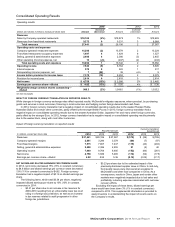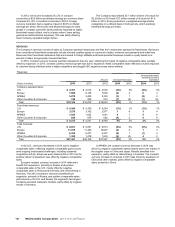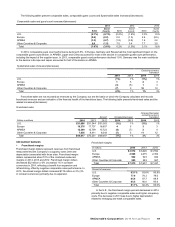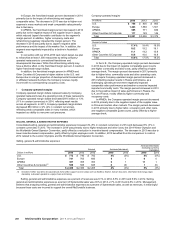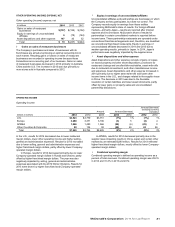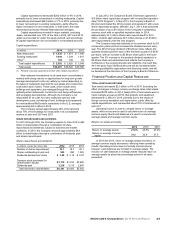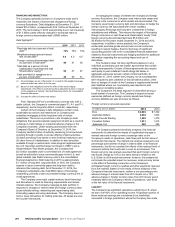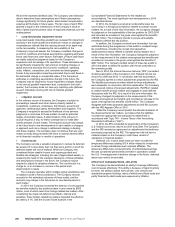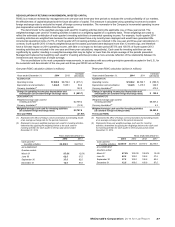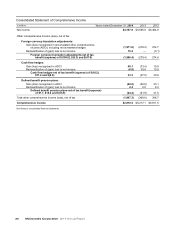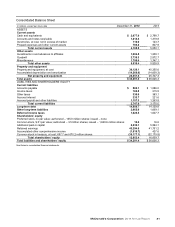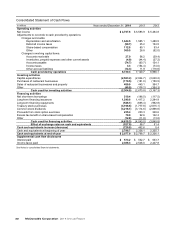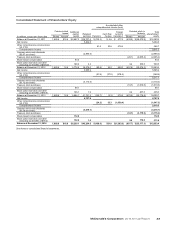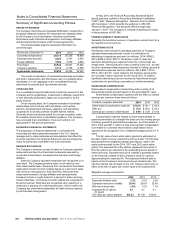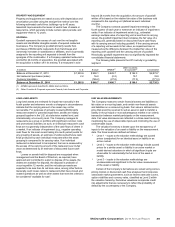McDonalds 2014 Annual Report Download - page 32
Download and view the complete annual report
Please find page 32 of the 2014 McDonalds annual report below. You can navigate through the pages in the report by either clicking on the pages listed below, or by using the keyword search tool below to find specific information within the annual report.
26 McDonald’s Corporation 2014 Annual Report
life and the expected dividend yield. The Company uses historical
data to determine these assumptions and if these assumptions
change significantly for future grants, share-based compensation
expense will fluctuate in future years. The fair value of each RSU
granted is equal to the market price of the Company’s stock at
date of grant less the present value of expected dividends over the
vesting period.
Long-lived assets impairment review
Long-lived assets (including goodwill) are reviewed for impairment
annually in the fourth quarter and whenever events or changes in
circumstances indicate that the carrying amount of an asset may
not be recoverable. In assessing the recoverability of the
Company’s long-lived assets, the Company considers changes in
economic conditions and makes assumptions regarding estimated
future cash flows and other factors. Estimates of future cash flows
are highly subjective judgments based on the Company’s
experience and knowledge of its operations. These estimates can
be significantly impacted by many factors including changes in
global and local business and economic conditions, operating
costs, inflation, competition, and consumer and demographic
trends. A key assumption impacting estimated future cash flows is
the estimated change in comparable sales. If the Company’s
estimates or underlying assumptions change in the future, the
Company may be required to record impairment charges. Based
on the annual goodwill impairment test, conducted in the fourth
quarter, the Company does not have any reporting units (defined
as each individual country) with risk of material goodwill
impairment.
Litigation accruals
In the ordinary course of business, the Company is subject to
proceedings, lawsuits and other claims primarily related to
competitors, customers, employees, franchisees, government
agencies, intellectual property, shareholders and suppliers. The
Company is required to assess the likelihood of any adverse
judgments or outcomes to these matters as well as potential
ranges of probable losses. A determination of the amount of
accrual required, if any, for these contingencies is made after
careful analysis of each matter. The required accrual may change
in the future due to new developments in each matter or changes
in approach such as a change in settlement strategy in dealing
with these matters. The Company does not believe that any such
matter currently being reviewed will have a material adverse effect
on its financial condition or results of operations.
Income taxes
The Company records a valuation allowance to reduce its deferred
tax assets if it is more likely than not that some portion or all of the
deferred assets will not be realized. While the Company has
considered future taxable income and ongoing prudent and
feasible tax strategies, including the sale of appreciated assets, in
assessing the need for the valuation allowance, if these estimates
and assumptions change in the future, the Company may be
required to adjust its valuation allowance. This could result in a
charge to, or an increase in, income in the period such
determination is made.
The Company operates within multiple taxing jurisdictions and
is subject to audit in these jurisdictions. The Company records
accruals for the estimated outcomes of these audits, and the
accruals may change in the future due to new developments in
each matter.
In 2014, the Company increased the balance of unrecognized
tax benefits related to tax positions taken in prior years by $505
million, most of which came from foreign-related tax matters. After
considering the impact of deferred tax offsets, interest and
penalties, these foreign-related tax matters impacted the effective
tax rate by 4.1%. See the Income Taxes footnote in the
Consolidated Financial Statements for the related tax
reconciliations. The most significant new developments in 2014
are described below.
In 2014, the Company received an unfavorable lower tax
court ruling in a foreign tax jurisdiction related to exempt income
matters. As a result of this new information, the Company changed
its judgment on the sustainability of this tax position for 2003-2010
and recorded an increase in the gross unrecognized tax benefits
of $188 million. The Company intends to pursue all available
remedies to defend this tax position.
In addition, the Company received new information from tax
authorities during the progression of tax audits in multiple foreign
tax jurisdictions, including the receipt of proposed tax
assessments primarily related to transfer pricing matters. As a
result of this new information, the Company changed its judgment
on the measurement of the related unrecognized tax benefits and
recorded an increase in the gross unrecognized tax benefits of
$207 million. The Company settled certain of these tax audits in
2014 and plans to defend its position with the tax authorities on
the remaining audits.
Also in 2014, the Internal Revenue Service (“IRS”) concluded
its field examination of the Company’s U.S. Federal income tax
returns for 2009 and 2010. In connection with this examination,
the Company agreed to certain adjustments proposed by the IRS.
The liabilities previously recorded related to these adjustments
were adequate. In connection with this examination, the Company
also received notices of proposed adjustments ("NOPAs") related
to certain transfer pricing matters and engaged in audit defense
discussions with the IRS. As a result of this new information, the
Company changed its judgment on the measurement of the
related unrecognized tax benefits and recorded an increase in the
gross unrecognized tax benefits of $38 million. The Company
disagrees with these proposed adjustments and will file a protest
with the IRS Appeals Office in 2015.
While the Company cannot predict the ultimate resolution of
the aforementioned tax matters, we believe that the liabilities
recorded are appropriate and adequate as determined in
accordance with Topic 740 - Income Taxes of the Accounting
Standards Codification (“ASC”).
In 2012, the IRS completed its examination of the Company's
U.S. federal income tax returns for 2007 and 2008. The Company
and the IRS reached an agreement on adjustments that had been
previously proposed by the IRS. The agreement did not have a
material impact on the Company's cash flows, results of
operations or financial position.
Deferred U.S. income taxes have not been recorded for
temporary differences totaling $15.4 billion related to investments
in certain foreign subsidiaries and corporate affiliates. The
temporary differences consist primarily of undistributed earnings
that are considered permanently invested in operations outside
the U.S. If management's intentions change in the future, deferred
taxes may need to be provided.
EFFECTS OF CHANGING PRICES—INFLATION
The Company has demonstrated an ability to manage inflationary
cost increases effectively. This ability is because of rapid inventory
turnover, the ability to adjust menu prices, cost controls and
substantial property holdings, many of which are at fixed costs and
partly financed by debt made less expensive by inflation.



